Soft Cooking
On complex PTSD and cooking without knives. Words and photos by Hanna Thomas Uose.
Good morning, and welcome to Vittles! Today, Hanna Thomas Uose has written for our Cooking from Life column, a series of essays that give a window into how food and kitchen-life works for different people in different parts of the world. Hanna has written about the method of ‘soft cooking’ she developed to help her to prepare food while living with complex PTSD.
We recently announced Issue 2 of our print magazine: the Bad Food issue. If you pre-order a copy before 1 December, you will receive it for a discounted price, with an extra discount for paid subscribers (see the original email for details).
My then-boyfriend watched me slice tomatoes on his chopping board, a few weeks after I had moved in. A scoff, then a laugh that became irritation. Why are you doing it like that? He was referring to the way I gripped the knife like a spoon, how the fingers of my left hand were dangerously placed, how the mushy, seedy result was nothing like the small, clean diced cubes he made for his daily salad of chopped tomatoes, mini cucumbers, carrots and some dill or parsley, all dressed in tahini and lemon.
The sound of the knife on wood made my ears drum
I found the chopped salads boring and utilitarian, but went along with them since I was in his house and knew I needed more sustenance than the chocolate-covered pretzels I had stashed in the fridge door to stop them from melting. I would boil eggs to top the salad or grill the pitta, but after his criticism I would never volunteer to chop again. More importantly – an even bigger deterrent than his fault-finding – the sound of the knife on wood made my ears drum.
It happens often. Like a taiko drummer has taken sudden residence in my head and is playing that beat from Jumanji, signalling an invitation to another world, one more threatening. It’s actually called pulsatile tinnitus, my blood pressure rising so high that I can hear my heart throb in my ears, blood rushing through the carotid artery. It can happen when I hold a knife. It can happen when someone else is holding one. It can happen when something just sounds like a knife – the sound of metal on metal, cutlery or pots and pans being put away. I can even be in another room and I will hear the drumming before I am consciously aware that another person has started cooking or tidying. My ears are on high alert. This is why I am bad at chopping. Any recipe which includes an estimated time – say, thirty minutes – will likely stretch to sixty or ninety under my watch because I am so slow, distracted by the drums.
It can happen when I hold a knife. It can happen when someone else is holding one. It can happen when something just sounds like a knife – the sound of metal on metal, cutlery or pots and pans being put away.
When I was a teenager, I spent days in silence. A catastrophic argument with my mother, of the scale that happened once or twice a year, would result in the silent treatment, sometimes for weeks on end. I would wake up to an empty house, my mother and stepfather having left for work and my younger sister and brother at school or nursery already. I was sleeping in the attic with no alarm and no wake-up call. I would come home from school to an empty house and then, two hours later, the others would arrive. My mother would stand silent, eating at the kitchen counter while I ate a chicken fillet, baby carrots and potatoes – all boiled and unsalted – with my much younger siblings. Then they would all go to bed, no goodnights. Just silence – mine and theirs. In between there was the sound of cutlery, of washing up, of clinking, the soundtrack to tension and the anticipation of future explosions.
There was an episode with a bread knife, waved in my face as I was told off for being rude. At the time I thought, Do not make this mean anything. But I did – I filed it away under ‘trauma’ and have felt scared of knives ever since. I would like to walk to the shop near me that sells expensive, super-sharp Japanese knives and purchase one – affirm something about my heritage, feel posh and capable – but I would be too scared to use it.
I would like to walk to the shop near me that sells expensive, super-sharp Japanese knives and purchase one – affirm something about my heritage, feel posh and capable – but I would be too scared to use it.
At the height of the lumbersexual aesthetic, I walked into a store in Portland that sold aspirational camping equipment for tech bros. I bought a Mercator Black Cat folding knife for $45. I was in the middle of a cycling trip down the West Coast and I thought the knife would make me feel more competent on the road. I chopped and opened things with it, but the blade was never steady in my hand, and I felt frightened when I cleaned it.
I contacted a therapist, Tony, via email:
I can feel myself tipping over, due to [redacted], and [redacted]. I’ve slipped into some negative patterns, and even developed a sort of phobia / strange tinnitus reaction when cooking with other people, which is truly becoming very difficult to live with! I believe that recent events have brought up some deep-seated issues for me, and I might be suffering from a mild case of post-traumatic stress. I think I might need 4-6 sessions?
I saw Tony every week for the next nine years. The drumming in my ears is a symptom of complex PTSD.
For most of those nine years, I lived alone. Happily, the drumming doesn’t occur when on my own, and I don’t even have to use knives at all. I have created a form of cooking that suits me – I call it soft cooking. I am drawn to soft foods and stirring, folding and mashing instead of slicing and dicing. I bought a new rice cooker and learned to make tamagoyaki-inspired scrambled eggs, flavoured with soy sauce and toasted sesame oil. What I hear: the soothing sound of running water as I rinse the rice, the Zojirushi ‘mystery song’ that plays when the rice is cooked (which – if you want to be a nerd about it – is a mechanical rendition of ‘Amaryllis’, a melody from the 1581 Ballet Comique de la Reine), the light drone of a wooden spoon swirling eggs in a pan, the crinkle of a plastic salad bag, which, to be honest, I could still do without. I arrange the leaves on the side, then cover it all with a shake of wasabi-flavoured furikake. If I am feeling up to it, I’ll graduate to a butter knife to split open an avocado and tease out the stone. Sometimes I use the same friendly knife (all curved edges – hard to kill someone with a butter knife) to work through a block of smoked tofu.
I am drawn to soft foods and stirring, folding and mashing instead of slicing and dicing.
My current partner is a fantastic cook. At first, I rallied to match him, looked up recipes on NYT Cooking and Feast. But soon that fell away; I could not prepare a delicious meal in that gap between work ending and his arrival without stress sitting on my chest. I would stop the day an hour early, spend two hours in slow preparation, only to serve him an oversalted stew with a thump in my ears. I made him the scrambled eggs once and felt embarrassed. They are tasty and nutritious, but they do not have the sheen of a Meera Sodha or Anna Jones, of someone who was taught how to cook. He is now Head of Cooking, and I am Head of Washing-Up.
I told him that we need to find strategies for dealing with the drumming if he will be here more, cooking. We have experimented with dancing every time it begins, bopping from side to side in an effort to distract me, to remind me that I am in a different reality: one where I can leave if I need to. I bought a KitchenAid mini chopper, which is hands down the best thing I have purchased in the last decade – it whizzes up herbs and nuts and onions in seconds, minus the thudding sound of a blade against a board. That has made things easier. Lately, music has been the thing that works, especially Sade. Cherish the day / I won’t go astray / I won’t be afraid / You won’t catch me running. Lately, he has been doing the chopping while I make muffins. And when he is not here, I stick to my soft ways.
Tamagoyaki-inspired Scrambled Eggs with Rice and Salad
The following is adapted from Eric Kim’s original recipe.
Serves 1
Time 30–45 mins (depending on your rice cooker)
Ingredients
100g short-grain sushi rice
1 bag pre-washed salad
1 tbsp miso and sesame dressing (I use this pre-mixed one, but see here for a recipe)
2 eggs
2 garlic cloves, crushed
½ tsp soy sauce
¾ tsp sugar
1 tsp toasted sesame oil
1 tbsp furikake
Method
Place the rice in a bowl and add water. Gently swirl the grains with your hand and tip the starchy water away. Repeat around three times, or until the water runs clear.
Add the rice and 125ml fresh water to your rice cooker and cook on the ‘sushi rice’ or ‘white rice’ setting.
Open the bag of salad and plate. Pour over the dressing.
When the rice is done, keep warm in the cooker while you whisk the eggs, garlic, soy sauce and sugar together.
Heat the toasted sesame oil in a pan and scramble the eggs, using a rubber spatula to create large, soft curds. This should only take a minute or two.
Plate the rice and eggs. Top with the furikake.
Eat. Enjoy the silence.
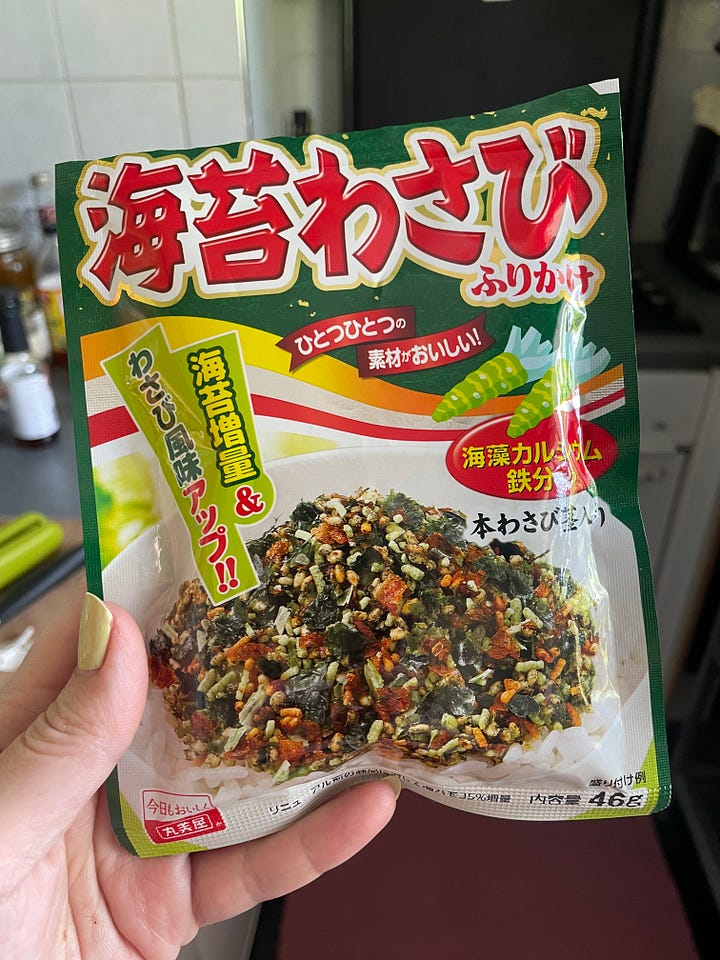
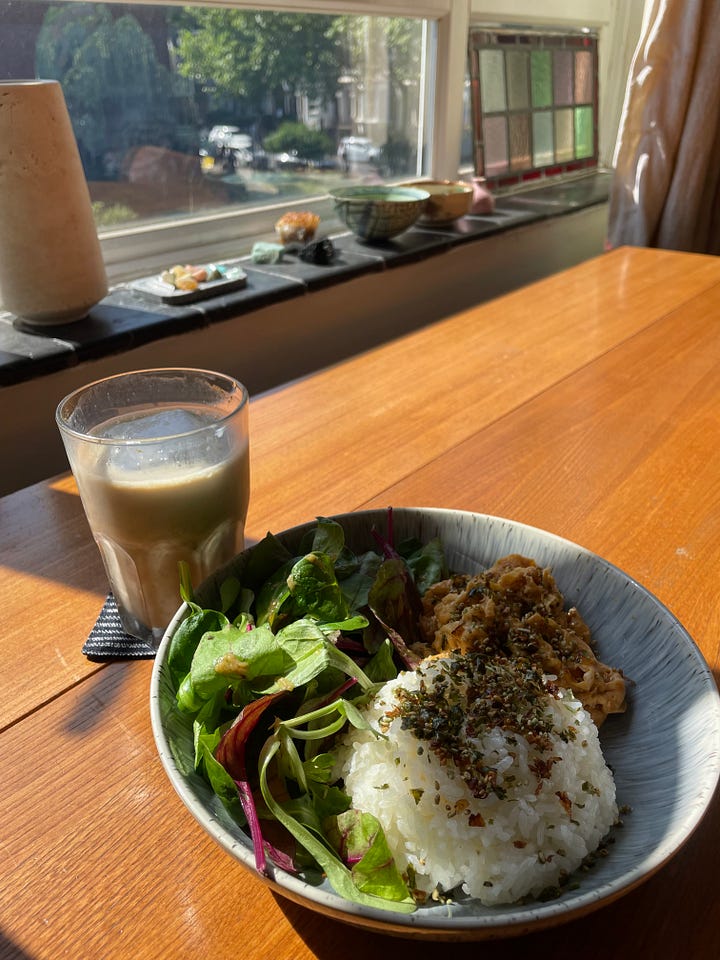
Credits
Hanna Thomas Uose is a British-Japanese writer. Her debut novel Who Wants to Live Forever was published in March 2025 by Brazen / Hachette and picked for the BBC Radio 2 Book Club and the Good Housekeeping Good Books Spring Collection. She has an MA in Prose Fiction from the University of East Anglia and, in 2022, won the Morley Prize for Unpublished Writers of Colour. Hanna is also a co-founder of Align, a strategic consultancy for the progressive movement.
The full Vittles masthead can be found here.



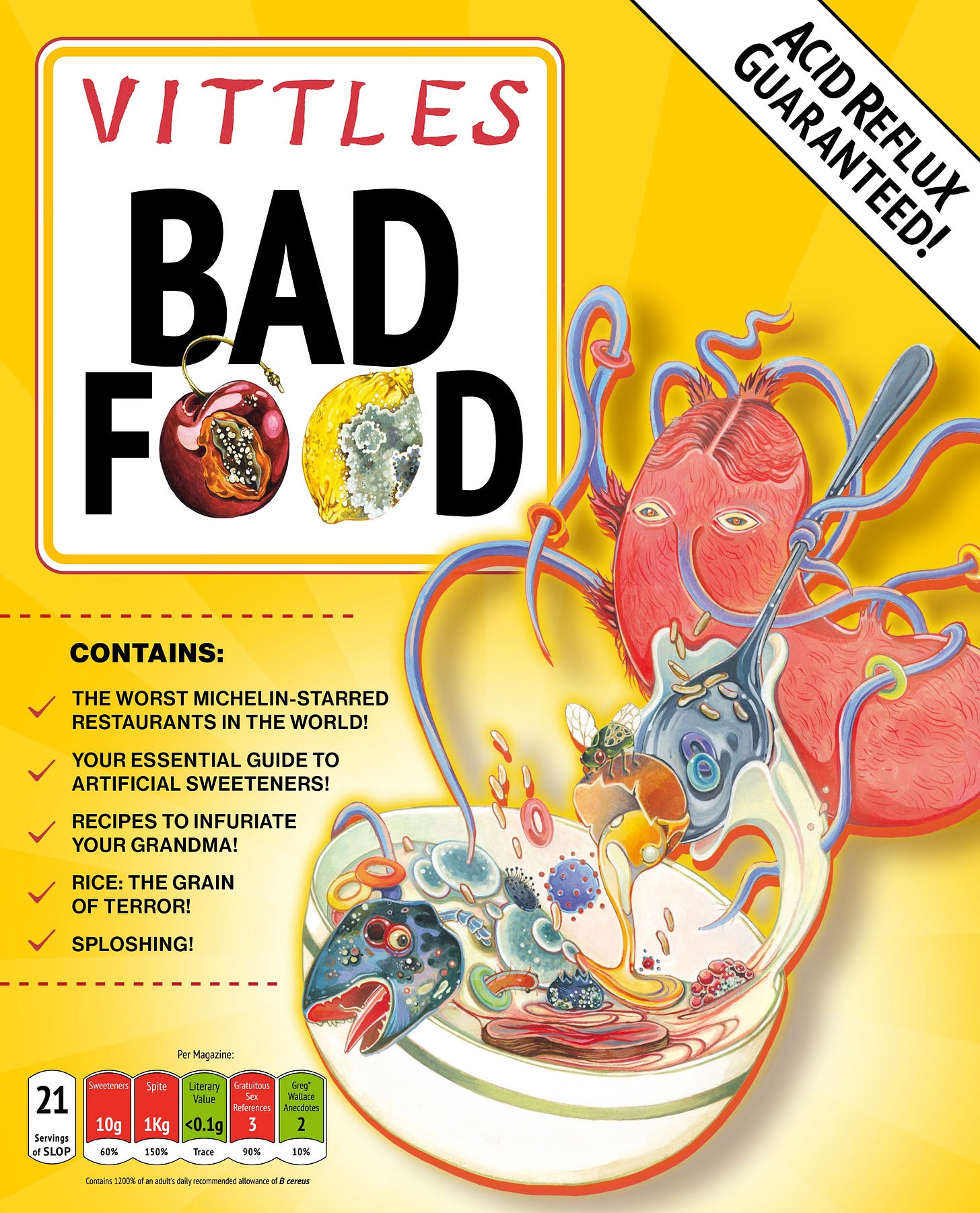
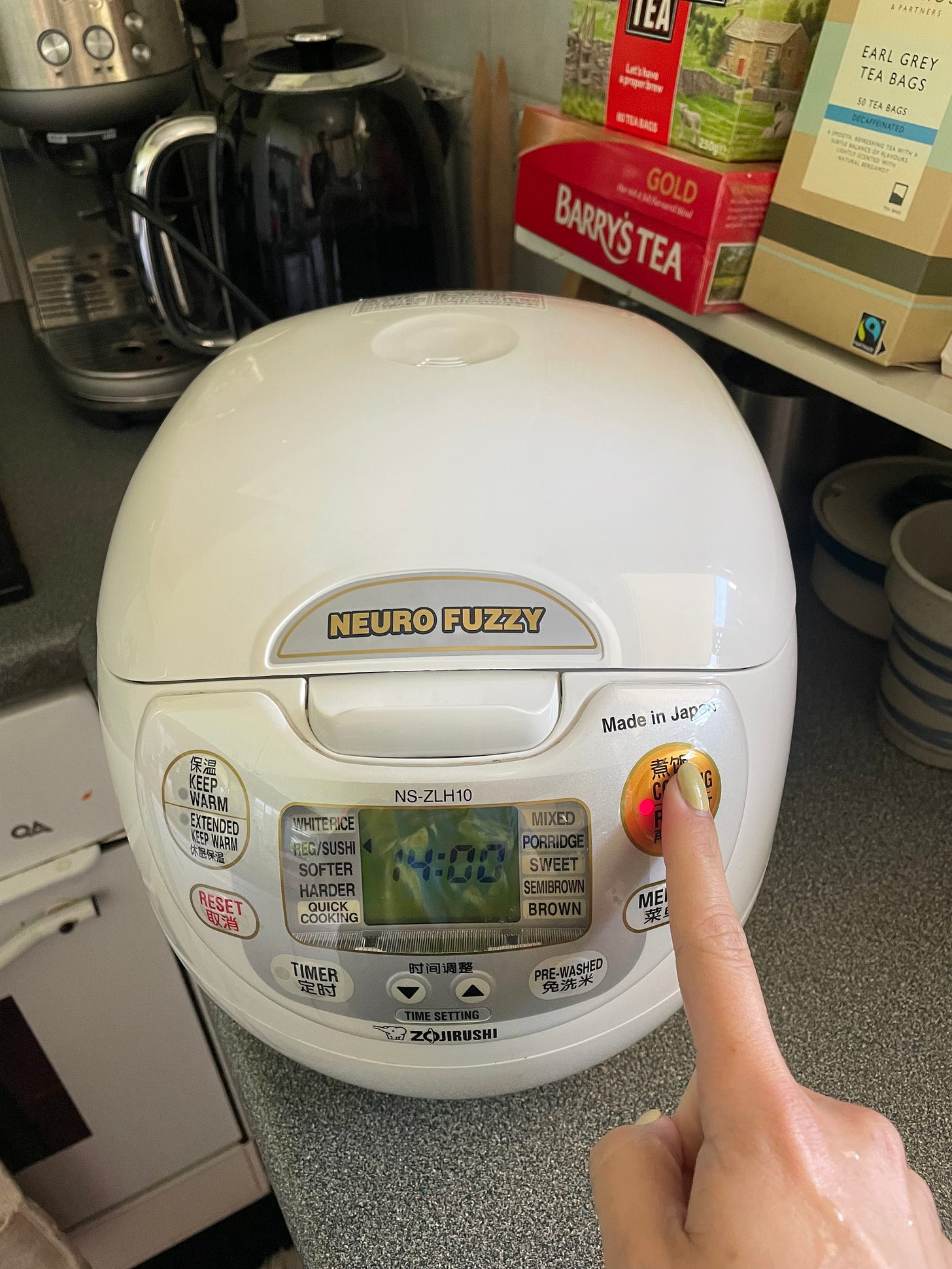
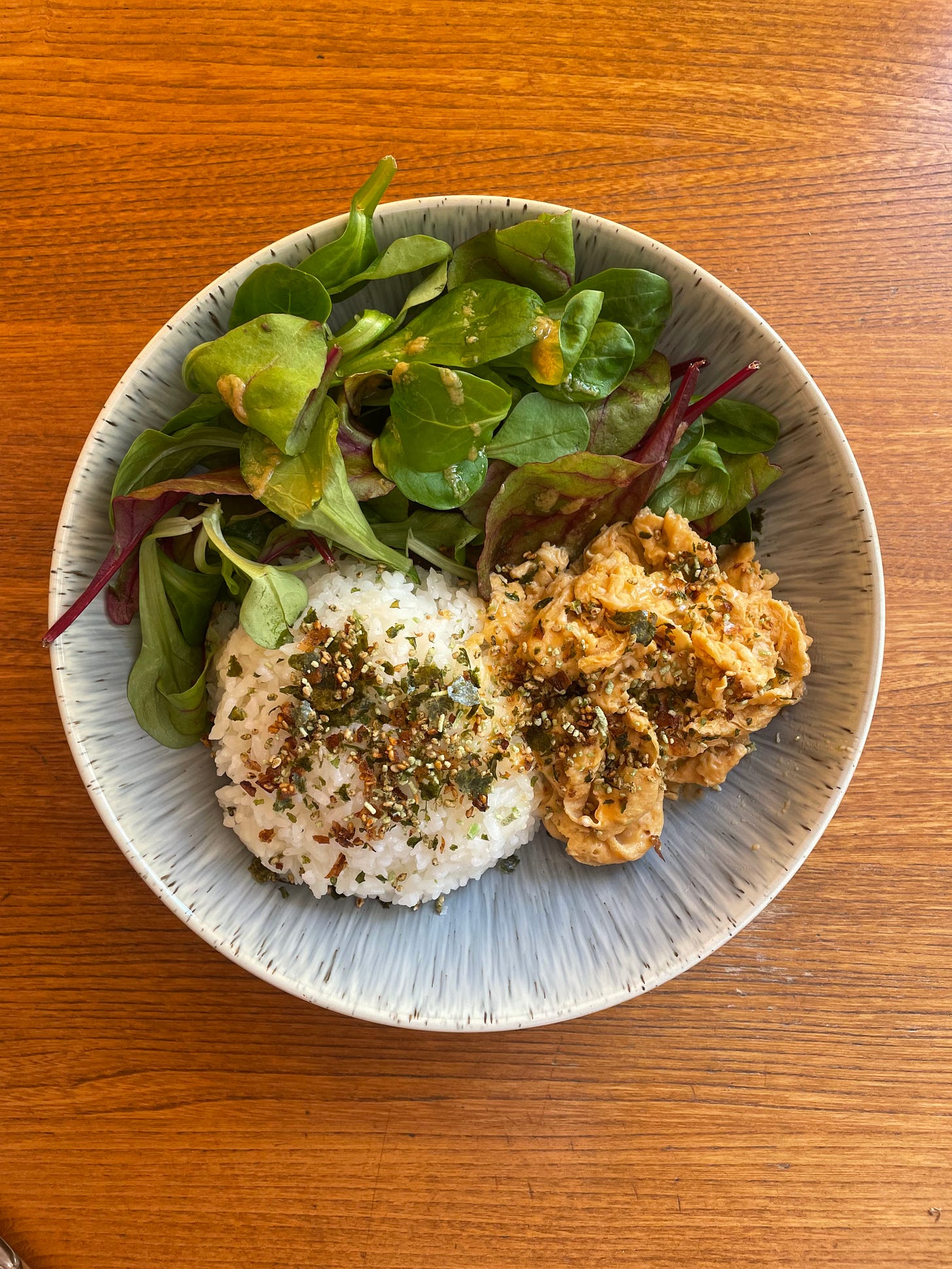
What a beautiful piece ❤️
This was a really moving read.